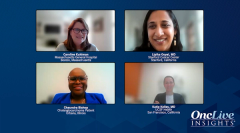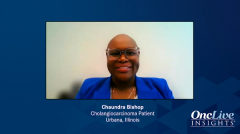
Patient Perspective Regarding FGFRi Adverse Event Profiles
A patient with cholangiocarcinoma shares her experience while being treated with an FGFR inhibitor, as well as insights on what providers should tell their patients to help them best manage or possibly prevent these adverse events.
Episodes in this series

This page is funded by Taiho Oncology, Inc. The faculty and publisher are solely responsible for this content. Taiho does not recommend or endorse the use of its products other than as described in the approved labeling. The content of this page is not medical advice and does not replace independent medical judgment.
This is a video synopsis/summary of an OncLive Insights involving Lipika Goyal, MD; Chaundra Bishop; R. Katie Kelley, MD; and Caroline Kuhlman, NP.
Bishop, who has cholangiocarcinoma and was treated with an FGFR inhibitor, experienced many adverse effects firsthand. She recalled thorough discussions with her doctor about anticipated adverse events within clinical trials but less robust conversations about standard chemotherapy. Typically treatment focuses on managing common gastrointestinal issues rather than fully reviewing possibilities and specifics.
For example, although nail changes were mentioned as potential adverse effects, details were lacking on expected manifestations and appearance. Bishop was surprised by the onset of hyperphosphatemia, although she noted that she had received advice about dietary phosphorus for managing levels. She advises patients to inquire about preventative mitigation approaches. Additionally, enhanced explanations about uncommon effects would be useful, including concrete symptoms, duration, reversibility, and thresholds warranting clinician notification.
Dr Goyal agreed that specificity is paramount when reviewing adverse effect profiles with patients, rather than simply listing possibilities. Understanding real-life implications and available interventions makes experiences far more navigable. Bishop concurred, stating that robust discussions with patients about toxicities are imperative.
In summary, although oral therapies may seem less daunting than intravenous options, thorough adverse event counseling remains vital to set expectations and enable self-care. Patients deserve clarity on potential symptom presentation, not just incidence rates, the experts agreed.
Video synopsis is AI-generated and reviewed by OncLive® editorial staff.







































